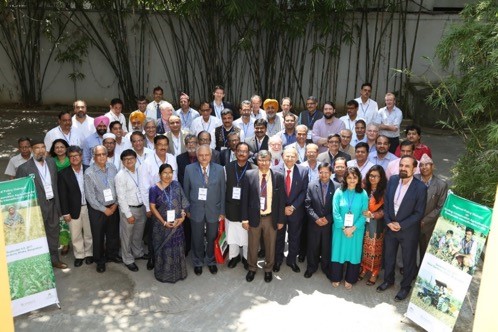DAHKA, Bangladesh (CIMMYT) – A two-day regional policy dialogue on scaling conservation agriculture for sustainable intensification in South Asia was held in Dhaka, Bangladesh from September 8-9, 2017.

The event was a supported by the Australian Center for International Agricultural Research (ACIAR), and was organized jointly by the Trust for Advancement of Agricultural Sciences (TAAS) and the International Maize and Wheat Improvement Center (CIMMYT) in collaboration with national agricultural research systems from across South Asia, CGIAR institutes and Australian Organizations. Government officials, researchers, and policymakers actively participated and deliberated challenges and ways forward to scale up sustainable agriculture in South Asia.
High input costs, depleted and degraded natural resources, indiscriminate and imbalanced use of chemical fertilizers and adverse effects from climate change make South Asia – home to about 1.766 billion people (one fourth of the world’s population) – one of the most food insecure regions in the world.
A region-wide shift from conventional agriculture to more sustainable technologies and practices, such as no-till farming or precision land leveling, is critical towards combating these challenges.
Raj Paroda, TAAS chairman, highlighted this need during the dialogue by calling for increased agricultural development assistance from international donors that focuses on mainstreaming sustainable agriculture, a key element in achieving the Sustainable Development Goals (SDGs), a set of 17 global goals spearheaded by the United Nations to end poverty, protect the planet, and ensure prosperity for all.
“The adaptation of conservation agriculture in South Asia, specifically in the Eastern Gangetic Plains, has shown impressive results in terms of saving costs and resources, and boosting income,” said John Dixon, Principal Advisor of ACIAR. “However, the widespread adaptation of conservation agriculture is held back by policy barriers. Institutions and policies have yet to be optimized in a way that facilitates and encourage [its] spread.”
According to Dixon, the regional policy dialogue allowed delegates to share experiences from their own countries and identify which policy changes, institutions and regulations can be adapted in a way that accelerates the widespread adoption of sustainable practices like conservation agriculture.
Paroda closed the dialogue by suggesting that delegates work towards enabling policies to increase funding, coordination and convergence of international private and public funder interest. He suggested the development of an active regional platform that would suggest a roadmap based on the current status, would help share knowledge, initiatives and advocate for policies relating to opportunities for capacity building and regional partnerships. He also identified that the promotion of new innovations through a network of young entrepreneurs and service providers and strong public-private partnerships as key elements to mainstreaming the adoption of sustainable agriculture across the region.

 Climate adaptation and mitigation
Climate adaptation and mitigation 
